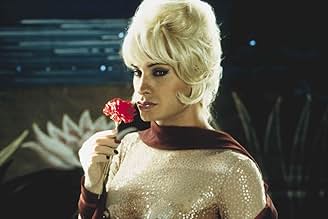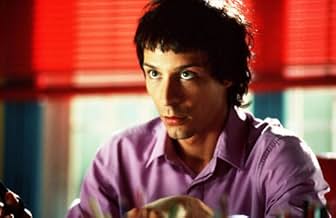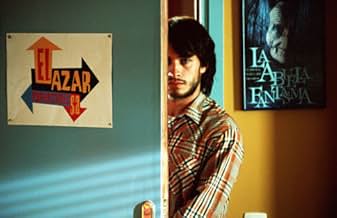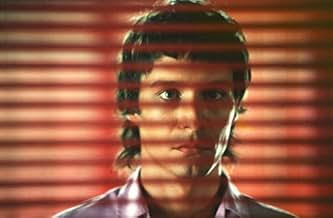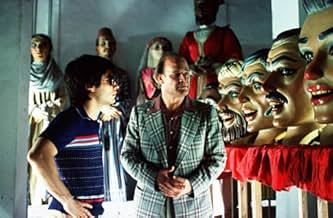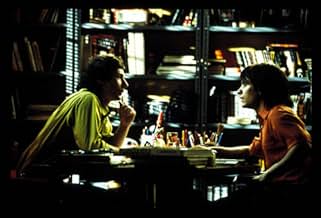An examination on the effect of Franco-era religious schooling and sexual abuse on the lives of two longtime friends.An examination on the effect of Franco-era religious schooling and sexual abuse on the lives of two longtime friends.An examination on the effect of Franco-era religious schooling and sexual abuse on the lives of two longtime friends.
- Nominated for 1 BAFTA Award
- 16 wins & 42 nominations total
Nacho Pérez
- Ignacio
- (as Ignacio Pérez)
Raúl García Forneiro
- Enrique
- (as Raúl Gª Forneiro)
Agustín Almodóvar
- Limpiador Piscina
- (uncredited)
Pedro Almodóvar
- Limpiador Piscina
- (uncredited)
Robert Forcadell
- Man in public
- (uncredited)
Luis Lobos Negros
- Motero ochentero
- (uncredited)
- Director
- Writer
- All cast & crew
- Production, box office & more at IMDbPro
Featured reviews
Is it an accusation of the Catholic Church or is it the story of a priest who is bound by his religion to strict rules concerning sex and feelings? Is there a theme in the film or is it just a story? Those are a couple of questions I asked myself after seeing La Mala Educación from the Spanish director Pedro Almodóvar.
Actually, La Mala Educación exists of three stories which have been interwoven in a miraculous way. Story one: film director Enrique is being paid a visit by a long lost friend. That friend, Ignacio, is an actor and has written a story that Enrique might want to make into a film. Enrique's story is for one part made up by Ignacio's and Enrique's experiences when they were young boys and were living in a Catholic boarding school. Ignacio reads the manuscript and sees the pictures in his head, and that is story two: a transvestite finds an old friend, Ignacio. After having sex, the transvestite steals a manuscript Ignacio wrote about his secret: while in boarding school he was sexually abused by a priest. To gain money, the transvestite blackmails the priest: give me money or I'll publish the manuscript. The priest reads parts of the manuscript. And that is the third story: the experiences of the real Enrique and the real Ignacio while attending boarding school. During that time they discovered the meaning of friendship, love and physical desires.
You have to keep up with the film. When your attention wanes you might miss a detail that's important later. When seeing the film, try to remember the names of the characters very quickly. It makes viewing easier.
Is La Mala Educación a typical Pedro Almodóvar film? Yes and no. No, since women are not the main theme, as in his other films. No, because it's not an unbelievable and absurdist story. Yes, since the film has some typical Almodóvar characteristics: the transvestite, the junkie that is caught on the lee shore, and the hope people have to reach a better life. More than in other Almodóvar films homosexuality is an important theme.
When the film was over you could see the visitors of the cinema thinking: is it a film about the Catholic Church, about emotions and selfishness, about The scenes had to fall in place.
Actually, La Mala Educación exists of three stories which have been interwoven in a miraculous way. Story one: film director Enrique is being paid a visit by a long lost friend. That friend, Ignacio, is an actor and has written a story that Enrique might want to make into a film. Enrique's story is for one part made up by Ignacio's and Enrique's experiences when they were young boys and were living in a Catholic boarding school. Ignacio reads the manuscript and sees the pictures in his head, and that is story two: a transvestite finds an old friend, Ignacio. After having sex, the transvestite steals a manuscript Ignacio wrote about his secret: while in boarding school he was sexually abused by a priest. To gain money, the transvestite blackmails the priest: give me money or I'll publish the manuscript. The priest reads parts of the manuscript. And that is the third story: the experiences of the real Enrique and the real Ignacio while attending boarding school. During that time they discovered the meaning of friendship, love and physical desires.
You have to keep up with the film. When your attention wanes you might miss a detail that's important later. When seeing the film, try to remember the names of the characters very quickly. It makes viewing easier.
Is La Mala Educación a typical Pedro Almodóvar film? Yes and no. No, since women are not the main theme, as in his other films. No, because it's not an unbelievable and absurdist story. Yes, since the film has some typical Almodóvar characteristics: the transvestite, the junkie that is caught on the lee shore, and the hope people have to reach a better life. More than in other Almodóvar films homosexuality is an important theme.
When the film was over you could see the visitors of the cinema thinking: is it a film about the Catholic Church, about emotions and selfishness, about The scenes had to fall in place.
Enrique is a film director working on his new project when an old school friend, Ignacio, arrives looking for acting work. Enrique fobs him off with excuses and Ignacio leaves him with a story he has written called 'The Visit'. The story is based on their childhood together as well as having a totally fictional section where Ignacio (Zahara). As Enrique reads the story it takes him back to his childhood effectively where they fell in love as boys before being separated by Father Manolo who also loved Ignacio. When he decides to make the film of the story it only serves to spark more memories as well as bringing revelations.
When I read the plot summary for this film I assumed that it would be difficult to penetrate (pardon the pun) and that I would struggle to follow it. Now that I think back on it I wonder how on earth I managed to follow a film that has threads and characters that don't exist even within the film and it is to the film's credit that it works really well. The film appears to have about three of four stories but really it is only one story that we are being told and a very effective story it is. It is engaging and very well written we care about the characters even as they change and trick us. Only the final 20 minutes appear to be unsure of themselves and it is here that the film drags slightly, but at till this point it is all great. This is not to say it is an easy watch because it isn't.
If you are homophobic then this is not the film for you I am used to seeing shows (Oz, 6 Ft Under) where such acts are portrayed but I was taken aback by the graphic nature of the acts here. I don't mean you see anything but it leaves very little to your imagination. This is not a problem it's just that many men may find this difficult to watch. Likewise scenes involving mutual masturbation between young boys is hardly something that one can watch without feeling slightly uncomfortable. However the one thing the film does through all this is deliver good characters. As much as I couldn't watch Ignacio licking his fingers to wet his 'area' and ease penetrate I still liked him as a character. Even more pleasing was the fact that the film never makes Father Manolo a monster; of course there is no sympathy for the man in the film but it could have just made him a lecherous beast who the audience immediately hate a pantomime villain but the script creates a more complex character.
The cast do a great job of delivering these characters and they make it work very well even if come of them have to change characters midstream or be one of several actors playing the same character. Martínez plays the most consistent character in the film and he does well with a good part, even if he has a less showy role than some others. Bernal has the most difficult role and he does really well to keep the audience with him while delivering all sorts of roles! If nothing else he is a brave actor and he deserves good parts to do more work like this. I don't know the rest of the actors by name but I enjoyed the other queen in the fictional part and also the guy who played Manolo in the fictionalised and childhood sections. Boira's Ignacio lacks subtlety and is overblown but by his point of the film I think that was the whole point.
Overall this is far from most people's cup of tea even those used to seeing art films may find it hard going due to the graphic simulation of the sexual acts within the film. But despite this the film is really well delivered. Many Almodóvar fans have said this is one of his lesser films but I cannot agree when I think of the skill he displays in keeping the difficult narrative together. The characters are mostly well written and the story is engaging even if it flags a little bit at the end.
When I read the plot summary for this film I assumed that it would be difficult to penetrate (pardon the pun) and that I would struggle to follow it. Now that I think back on it I wonder how on earth I managed to follow a film that has threads and characters that don't exist even within the film and it is to the film's credit that it works really well. The film appears to have about three of four stories but really it is only one story that we are being told and a very effective story it is. It is engaging and very well written we care about the characters even as they change and trick us. Only the final 20 minutes appear to be unsure of themselves and it is here that the film drags slightly, but at till this point it is all great. This is not to say it is an easy watch because it isn't.
If you are homophobic then this is not the film for you I am used to seeing shows (Oz, 6 Ft Under) where such acts are portrayed but I was taken aback by the graphic nature of the acts here. I don't mean you see anything but it leaves very little to your imagination. This is not a problem it's just that many men may find this difficult to watch. Likewise scenes involving mutual masturbation between young boys is hardly something that one can watch without feeling slightly uncomfortable. However the one thing the film does through all this is deliver good characters. As much as I couldn't watch Ignacio licking his fingers to wet his 'area' and ease penetrate I still liked him as a character. Even more pleasing was the fact that the film never makes Father Manolo a monster; of course there is no sympathy for the man in the film but it could have just made him a lecherous beast who the audience immediately hate a pantomime villain but the script creates a more complex character.
The cast do a great job of delivering these characters and they make it work very well even if come of them have to change characters midstream or be one of several actors playing the same character. Martínez plays the most consistent character in the film and he does well with a good part, even if he has a less showy role than some others. Bernal has the most difficult role and he does really well to keep the audience with him while delivering all sorts of roles! If nothing else he is a brave actor and he deserves good parts to do more work like this. I don't know the rest of the actors by name but I enjoyed the other queen in the fictional part and also the guy who played Manolo in the fictionalised and childhood sections. Boira's Ignacio lacks subtlety and is overblown but by his point of the film I think that was the whole point.
Overall this is far from most people's cup of tea even those used to seeing art films may find it hard going due to the graphic simulation of the sexual acts within the film. But despite this the film is really well delivered. Many Almodóvar fans have said this is one of his lesser films but I cannot agree when I think of the skill he displays in keeping the difficult narrative together. The characters are mostly well written and the story is engaging even if it flags a little bit at the end.
Spoilers
Since 'Hable con ella' ('Talk to her', for which my summary line was 'Almodovar mellowing?') which some consider Almodovar's best, his fans have been looking forward to his next one with great expectation but also some apprehension as to how could he possibly tope it, in the sheer ingenious creativity, if nothing else. Bound for Cannes release, Bad Education soon demonstrated that the apprehension is not unfounded. It is, after all, not easy to surpass the achievement of Hanle con ella. Undoubtedly still Almodovar, Bad Education however is Almodovar melodrama, a little short of Almodovar masterpiece.
The film opens with attention grabbing, definitive music (regardless of what mood) that is Almodovar's hallmark. Similarly, we see the inimitable Almodovar feuding colours. Homosexuality and fetishism you'll almost always expect in an Almodovar film but there is less extreme perversity and violence compared with some of his other pictures.
And here comes the plot. The story of the young altar boys is told in a manuscript of a book entitled 'The Visit', which is used by one of the grown-up boys Ignacio, now a transvestite called Zahara, as a tool for blackmailing Father Manolo. But wait, all this is just in a screenplay. The story of Father Manolo and the altar boys however is real. The real Ignacio is the screenplay writer, who is trying to get Enrique the film director, another grown-up altar boy, to produce the film. But wait again, Ignacio doesn't want to be called Ignacio, claiming that he is now a fully transformed person called Angel, an actor trying very hard to get to play the part Zahara. Having fun yet? There's more. Enrique becomes suspicious if Ignacio/Angel is really the Ignacio he knew as a kid, and embarks on an investigation. Meanwhile, Father Monolo jumps out of the screenplay, materialising as a real person. And all these stories within stories are told jumping back and forth between past and present, fiction and reality. Enough? There's more, a lot more.
In the end, Bad Education, while enormously entertaining, stops at being just that instead of moving further into the realm of depth of emotion and breadth of creativity we see in Talk to Her and All About Mother. However, in addition to the entertainment, there is one particularly bright spot, one Gael Garcia Bernal (playing Angel and all the rest of them) who first served notice in the brilliant Mexican film Amores perros (2000) that he has to be reckoned with. I just can't wait to see him play Cuban revolutionary icon 'Che' Geuvara in Motorcycle Diaries (2004).
Since 'Hable con ella' ('Talk to her', for which my summary line was 'Almodovar mellowing?') which some consider Almodovar's best, his fans have been looking forward to his next one with great expectation but also some apprehension as to how could he possibly tope it, in the sheer ingenious creativity, if nothing else. Bound for Cannes release, Bad Education soon demonstrated that the apprehension is not unfounded. It is, after all, not easy to surpass the achievement of Hanle con ella. Undoubtedly still Almodovar, Bad Education however is Almodovar melodrama, a little short of Almodovar masterpiece.
The film opens with attention grabbing, definitive music (regardless of what mood) that is Almodovar's hallmark. Similarly, we see the inimitable Almodovar feuding colours. Homosexuality and fetishism you'll almost always expect in an Almodovar film but there is less extreme perversity and violence compared with some of his other pictures.
And here comes the plot. The story of the young altar boys is told in a manuscript of a book entitled 'The Visit', which is used by one of the grown-up boys Ignacio, now a transvestite called Zahara, as a tool for blackmailing Father Manolo. But wait, all this is just in a screenplay. The story of Father Manolo and the altar boys however is real. The real Ignacio is the screenplay writer, who is trying to get Enrique the film director, another grown-up altar boy, to produce the film. But wait again, Ignacio doesn't want to be called Ignacio, claiming that he is now a fully transformed person called Angel, an actor trying very hard to get to play the part Zahara. Having fun yet? There's more. Enrique becomes suspicious if Ignacio/Angel is really the Ignacio he knew as a kid, and embarks on an investigation. Meanwhile, Father Monolo jumps out of the screenplay, materialising as a real person. And all these stories within stories are told jumping back and forth between past and present, fiction and reality. Enough? There's more, a lot more.
In the end, Bad Education, while enormously entertaining, stops at being just that instead of moving further into the realm of depth of emotion and breadth of creativity we see in Talk to Her and All About Mother. However, in addition to the entertainment, there is one particularly bright spot, one Gael Garcia Bernal (playing Angel and all the rest of them) who first served notice in the brilliant Mexican film Amores perros (2000) that he has to be reckoned with. I just can't wait to see him play Cuban revolutionary icon 'Che' Geuvara in Motorcycle Diaries (2004).
One of the most consistently great directors I've come across continues to amaze me with his wonderful blend of surreal and artistic beauty within a narrative you'd expect from a soap opera or trashy romance novel.
Brilliant storytelling interweaving back and forth between past and present and a masterful way of bringing the truth to light.
Gael García Bernal gives a world class performance and the rest of the cast follows suit.
A truly fantastic and terrifyingly mesmerising film.
In "La Mala Educación", Almodóvar is very serious and too dark and tragic, when comparing to his previous movies. There are many usual elements, such as the attack to the Catholic Church, gays, travesties, homosexual intercourse, child abuse etc., but not in his common ironical, colorful and funny way; instead, the story is developed in a very bitter context. The screenplay magnificently discloses the plot, with a story inside another story, mixing "reality" with fiction; the direction of Pedro Almodóvar is excellent as usual; and Gael Garcia Bernal proves his versatility as an outstanding actor. Although being a great film, I do not dare to recommend "La Mala Educación" for any audiences. However, fans like me of this great Spanish director will certainly like it a lot. My vote is eight.
Title (Brazil): "Má Educação" ("Bad Education")
Title (Brazil): "Má Educação" ("Bad Education")
Did you know
- TriviaGael García Bernal fired off an angry riposte to New York Times reporter Lynn Hirschberg after she claimed that he had fallen out with Pedro Almodóvar over filming the explicit homosexual love scenes in the film. Bernal wanted it on record that he had had absolutely no reservations about taking the role.
- GoofsWhen Burenguer declines Ignacio's story over the phone, he says that he wouldn't be accepting it for "Short Stories of the 80's." According to his story, it would have had to been at least 1977, three years before the 1980s, let alone before a compilation of stories from the 1980s would be released.
- Alternate versionsAn R-rated version of the film that trims or cuts some scenes was released on DVD, though the original NC-17 one is also available in the exact same format.
- SoundtracksQuizás, Quizás, Quizás
Written by Osvaldo Farrés
Published by Peer International Corporation (BMI)
(c) 1947 by Caribbean Music Co. Ltd
Performed by Sara Montiel
By the license from Dpto. de Productos Especiales de (p) EMI Odeon, S.A., Madrid, España, 2003
- How long is Bad Education?Powered by Alexa
Details
- Release date
- Countries of origin
- Official site
- Languages
- Also known as
- Bad Education
- Filming locations
- Production companies
- See more company credits at IMDbPro
Box office
- Budget
- $5,000,000 (estimated)
- Gross US & Canada
- $5,284,284
- Opening weekend US & Canada
- $147,370
- Nov 21, 2004
- Gross worldwide
- $40,432,275
- Runtime
- 1h 46m(106 min)
- Sound mix
- Aspect ratio
- 2.35 : 1
Contribute to this page
Suggest an edit or add missing content

